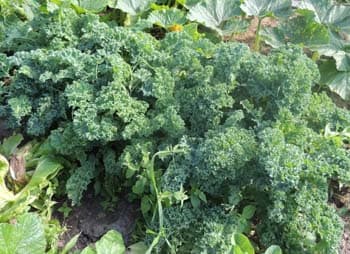Health Benefits of Kale

About the Health Benefits of Kale
Health experts praise the health benefits of Kale. It is heralded as the new “Super Food”. That’s because the benefits and nutritional value of Kale leaves are nothing less than spectacular. There’s just one problem with it. A lot of people do not lie Kale, And, some people won’t even try it!
Health-conscious Americans are now eating Kale frequently, in a wide variety of recipes. If Kale is new to you, get started by adding it to garden salads, soups, and can be mixed into vegetable smoothies. Kale can also be cooked, like spinach.
Even if you do not like Kale, the health benefits make it a very worthwhile addition to your diet. So, find ways to sneak a little Kale into salads, soups, stews and other recipes. Evey bite helps to make you and your family healthier.
Nutritional Value of Kale
Basically, Kale is high in the “good stuff”, and low in the “bad stuff”. Because of this, we all should eat more Kale.
Per the USDA Database:
| Protein | .68 g |
| Fat | .15 g |
| Carbohydrates | 1.4 g |
| Fiber | .6 g |
| Sugars | .36 g |
| Calcium | 24 mg |
| Potassium | 79 |
| Sodium | 6 |
| Vitamin C | 19 |
| Vitamin K | 112.8 mg |
| Vitamin A | 1678 mg |
Tip: To retain healthy nutrients, cook Kale for only a short period of time
Health Benefits of Kale
Eating Kale results in many health benefits:
- Helps to prevent Cancer – Kale contains healing compounds in the pigments and cells of the leaves. There are antioxidants and over 45 flavonoids, which can potentially prevent cancer.
- Helps to prevent and control Diabetes – helps to balance blood sugars and slows the rise of blood sugar
- Aids weight management – it’s a low-calorie, low-carb food.
- Promotes liver health
- Aids in digestion – high fiber content
- Helps lower cholesterol – high fiber
- lowers the risk of cataracts
- lowers the risk of macular eye degeneration
High levels of Vitamin K in Kale, can make blood thinners less effective. Consumption of Kale should be restricted, or avoided entirely, for individuals on blood thinners.
Important Note on Health Benefits of Lake
High levels of Vitamin K in Kale, can make blood thinners less effective. Consumption of Kale should be restricted, or avoided entirely, for individuals on blood thinners.
As a result, we strongly recommend you contact your doctor prior to adding significant amounts of Kale to your diet.
Because of the Health Benefits of Kale, You Should Seek Kale Recipes
May we suggest:
Kale with Sour Cream
Related Articles
Also, people who read this article liked:
National Kale Day at Holiday Insights
Please support our site. Shop for:
- rmmatthews100@hotmail.com
- 585-721-6528
- Rochester, NY
©1999-2024 GardenersNet.Com, All Rights Reserved

